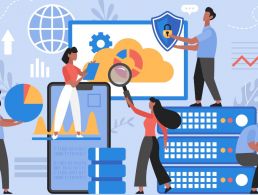What are the crucial ingredients for a well-rounded data scientist in today’s world? James Milligan, global head of technology at Hays, explains.
There’s no question that data science skills were an integral part of our world of work pre-pandemic. Big data has been on the rise as advancements in tech continue to disrupt industries and ways of working. But among the myriad changes the coronavirus pandemic has caused, a reliance on data is one of the most significant. The work of data scientists is very much in the spotlight and the value of their work is being felt perhaps more strongly than ever.
Having said this, just like so many other professions, data scientists need to adapt their skillsets to stay relevant in our changing world of work. Here are three of the top skills that I believe will be key for data scientists, now and in the near future.
1. Data visualisation
There is a huge demand currently for data-visualisation skills. It won’t come as a surprise that we need people to crunch the numbers – that will continue to be crucial. But what we’re seeing more of is the need to present this data in a way that people understand, which is a different skillset entirely.
Having dealt with the immediate impacts of the pandemic, lots of organisations are looking ahead and asking: what is our future business strategy going to be? And how do we use data to inform this strategy? This is particularly acute in organisations with a customer-facing function, whether that’s towards businesses or individuals. For a lot of them, their audiences have changed overnight now that much of the world is working remotely, so they now need to pivot by making quick decisions and re-strategising.
This is where data visualisation comes in. It’s the ability to take the numbers, draw out trends, opportunities and (most importantly) risks, and then present this in an easily digestible way to decision makers who don’t have a background in this area or work with data day in, day out.
One of the challenges to note with data visualisation is handling multiple data sources. Organisations will sometimes just use the data that they collect themselves from their customers and clients but, increasingly, they buy in additional data. The sticking point is disseminating and drawing meaning from different datasets and different sources – which is an ability a skilled data visualiser will possess.
2. Data management and governance
There’s no point in having excellent presentation of data if there are challenges with the integrity of the data to begin with, which brings me on to the next top skill: data management and governance. There has been a huge focus around this within organisations to ensure that outputs reached from analysing the data have integrity and are insightful.
The key things that businesses are looking at from a data management and government point of view are:
- Where the data is sourced from
- How clean it is
- How it has been analysed
These points are particularly important handling data from fixed fields, where it’s crucial that the fields are correct. Working with data in this way needs a professional to critique the terminology that has been used, how information has been tagged and whether this can be interpreted with integrity. If something isn’t correct, someone needs to spot this and rectify it immediately.
The world has moved on a lot in a short space of time and the language we used has changed. That means that the way we manage and govern data will, and in some cases already has, become redundant alarmingly quickly if it isn’t evolved.
3. Acumen and awareness
A less technical but just as vital skill for data scientists is having a high level of awareness for challenges that their organisation may be facing.
Historically, data scientists tended to be from academic backgrounds, often reaching PhD level. This acumen in terms of mathematic and programming skills is still crucial, but with data being used more broadly across organisations and industries, so now is interacting with your organisation, understanding its needs and delivering your work accordingly.
Ultimately, it is a blend of technical and soft skills – most notably awareness, communication and adaptability – that data scientists need to strike. This blend might come from an individual or collectively from a team, where some are stronger on the numerical and data side and others more adept at facing clients. This way, data scientists will build the right products that solve the right problems for their organisation.
Data scientists are only becoming more important
The skills profile of a data scientist will continue to adapt and evolve along with our changing world of work, which is being impacted by the ongoing disruption caused by machine learning and AI.
What’s more, the role of a data scientist is only moving further into the spotlight because of the coronavirus pandemic. I don’t think it’s an exaggeration to say that almost every business has been forced to adapt and change – and the work of data scientists is vital to informing this.
James Milligan is global head of technology at Hays.




